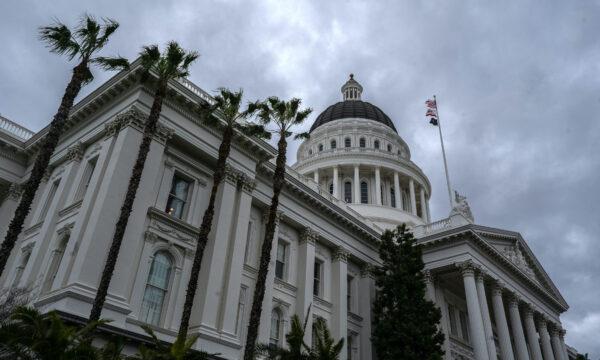California legislators narrowly passed an 11-percent excise tax on guns and ammunition Sept. 7 despite bipartisan opposition.
State Sen. Tom Umberg (D-Santa Ana) provided the final vote Democrats needed to pass Assembly Bill 28—the Gun Violence Prevention and Schools Act—passed with the two-thirds margin it required. The bill now awaits Gov. Gavin Newsom’s signature before becoming law.
The final tally was 27–9 after Sen. Marie Alvarado-Gil (D-Jackson) joined with Senate Republicans to vote against it. Four senators abstained.
The bill’s author, Assemblyman Jesse Gabriel (D-Los Angeles), stressed the importance of paying for gun violence prevention programs with funds generated by the new tax.
The measure passed the Assembly along party lines with a vote of 56–17. Seven additional members—six Democrats and one Republican—did not vote.
“It’s shameful that gun manufacturers are reaping record profits at the same time that gun violence has become the leading cause of death for kids in the United States,” Mr. Gabriel said in a July statement. “This bill will fund critical school safety measures and proven violence prevention programs that will save lives and protect communities across California.”
Important: Our sponsors at Jase are now offering emergency preparedness subscription medications on top of the long-term storage antibiotics they offer. Use promo code “Rucker10” at checkout!
The bill now awaits Gov. Gavin Newsom’s signature before becoming law. If signed, California would become the first state to impose such a tax, though some municipalities—such as Seattle and Pennsylvania—collect fees on gun sales and ammunition.

The federal government charges a similar tax on gun and ammunition sales. The United States began taxing guns and ammunition over 100 years ago and now charges 10 percent on the wholesale price of handguns and an 11 percent tax on long guns and ammunition to pay for wildlife restoration projects.
California already charges fees of $31 on gun sales to cover background checks.
The state’s tax and fee department estimates the new tax would generate $159 million from July 2024 to July 2025. If dealers pass the tax onto customers, it would generate another $14 million in state and local sales and tax revenue—$6.3 million of which would go to the state’s General Fund, according to a legislative analysis.
Survival Beef on sale now. Freeze dried Ribeye, NY Strip, and Premium beef cubes. Promo code “jdr” at checkout for 25% off! Prepper All-Naturals
The bill would also establish a fund to pay for school safety and gun-violence reduction programs, counseling and support programs for victims, firearm violence research, and a court-based program to seize firearms from subjects named in domestic violence protective orders.
Former Democratic Arizona Congresswoman Gabrielle Giffords, who survived an assassination attempt in 2011, applauded the measure’s passage.
“California just made history – again,” Giffords said in a statement posted on her website Giffords: Courage to Fight Gun Violence. “The state continues to take on the gun lobby and pave the way for effective methods to reduce gun violence.”
Additionally, the gun-control activist organization Moms Demand Action was grateful to legislators who approved the measure.
“This bill is an innovative approach to tackling gun violence and a crucial step to improve the safety of all California families,” Cassandra Whetstone, a volunteer with the group’s California chapter, said in a Sept. 7 statement. “We are grateful to gun sense champions in the [Legislature] and community partners who worked so hard to pass this comprehensive bill that seeks to make our communities safer and target the root causes of gun violence.”
However, the National Rifle Association (NRA) opposed the new tax, saying it was not fair.
“It is unjust to saddle law-abiding gun owners with special taxes,” the NRA said on its website. “Such a measure makes it more expensive for law-abiding citizens to exercise a constitutional right and discourages them from practicing to be safe and proficient with their firearms for purposes such as self-defense, competition, and hunting.”
Sales to active or retired law enforcement officers or any law enforcement agency would be exempt from the tax.
Among the lawmakers who opposed the measure, Ms. Alvarado-Gil told colleagues on the Senate floor Thursday she researched gun violence statistics, and her findings didn’t match data included in the bill. She said her data showed drug overdose deaths far outnumbered firearm deaths in the state.
She said she also discovered that California had the lowest mass-shooting victimization rate among the most populous states.
“For me, I tend to analyze the legislation before us,” Ms. Alvarado-Gil said. “When I look at this very sensitive issue, I feel that we have a duty to legislate through facts, and not fear.”
Sen. Brian Dahle (R-Bieber) also highlighted drug overdose deaths compared to those from gun violence when arguing against the bill.
According to Mr. Newsom’s office, California’s gun death rate is 43 percent lower than the rest of the nation’s and the state is ranked No. 1 for gun safety by the gun-control advocacy organization Giffords Law Center, also associated with the former Arizona congresswoman.
The state’s gun homicide rate is also 33 percent lower than the national average, the governor’s office said in a press release Aug. 29.
Meanwhile, California saw nearly 6,000 deaths from fentanyl in 2021, according to the California Department of Public Health.
“You want to do something about deaths in California, why don’t we focus on fentanyl?” Mr. Dahle asked senators. “Why don’t we focus on fentanyl more than we focus on taxing young folks and people who enjoy their Second Amendment rights?”
Sen. Kelly Seyarto (R-Murrieta) additionally called the bill “ineffective.” He also noted that some initiatives, such as gun buyback programs, can backfire and allow people to turn firearms into being destroyed after the guns are used in crimes.
“That gun gets destroyed and there goes the evidence,” Mr. Seyarto said. “Until we start going after where those illegal guns are coming from, and holding the people who have those illegal guns accountable, you are not going to do anything.”
Democrat Sen. Bill Dodd, of Napa, also opposed the bill, he said, because duck hunters were left out of the process.
“I think there is a way to exclude these 70,000 duck hunters [from paying the tax],” Mr. Dodd said. “Frankly, I look at this as something, when you add another 11 percent [tax], all it’s going to do is decrease the number of young hunters and sooner.”
Sen. Anna Caballero (D-Merced) agreed, saying duck hunters have contributed greatly to a large wetland conservation area in her district, and placing another fee on that kind of activity was an unfair burden.
Sen. Dave Cortese (D-San Jose) also refrained from voting because he did not agree with passing the tax onto consumers. He also said everyone should be paying for gun violence programs, not just firearm owners.
“It is a pass-through to the consumer and, frankly, it’s disingenuous to say it’s anything other than that. It’s not equitable,” Mr. Cortese said. “Why aren’t all of us paying for these programs?”
The California Rifle and Pistol Association opposed the bill for the same reason.
Don’t just survive — THRIVE! Prepper All-Naturals has freeze-dried steaks for long-term storage. Don’t wait for food shortages to get worse. Stock up today. Use promo code “jdr” at checkout for 25% off!
“All of California’s law-abiding citizens benefit from efforts to implement programs which remediate the impacts of illegal gun violence upon our public, and all should equally help to fund their implementation,” the organization said in a statement. “Yet, AB 28 would unjustifiably place the entire burden of funding efforts to address illegal gun violence on the backs of law-abiding citizens who legally purchase and lawfully use firearms and ammunition.”
If approved, the firearm excise tax would begin in July 2024.
About the Author
Jill McLaughlin is an award-winning journalist covering politics, environment, and statewide issues. She has been a reporter and editor for newspapers in Oregon, Nevada, and New Mexico. Jill was born in Yosemite National Park and enjoys the majestic outdoors, traveling, golfing, and hiking.
Article cross-posted from our premium news partners at The Epoch Times.
- Concerned about your life’s savings as the multiple challenges decimate retirement accounts? You’re not alone. Find out how Genesis Precious Metals can help you secure your wealth with a proper self-directed IRA backed by physical precious metals.
What Would You Do If Pharmacies Couldn’t Provide You With Crucial Medications or Antibiotics?
The medication supply chain from China and India is more fragile than ever since Covid. The US is not equipped to handle our pharmaceutical needs. We’ve already seen shortages with antibiotics and other medications in recent months and pharmaceutical challenges are becoming more frequent today.
Our partners at Jase Medical offer a simple solution for Americans to be prepared in case things go south. Their “Jase Case” gives Americans emergency antibiotics they can store away while their “Jase Daily” offers a wide array of prescription drugs to treat the ailments most common to Americans.
They do this through a process that embraces medical freedom. Their secure online form allows board-certified physicians to prescribe the needed drugs. They are then delivered directly to the customer from their pharmacy network. The physicians are available to answer treatment related questions.




This is only going to drag CA into the courts when the inevitable lawsuit comes. You can NOT tax a right!!!